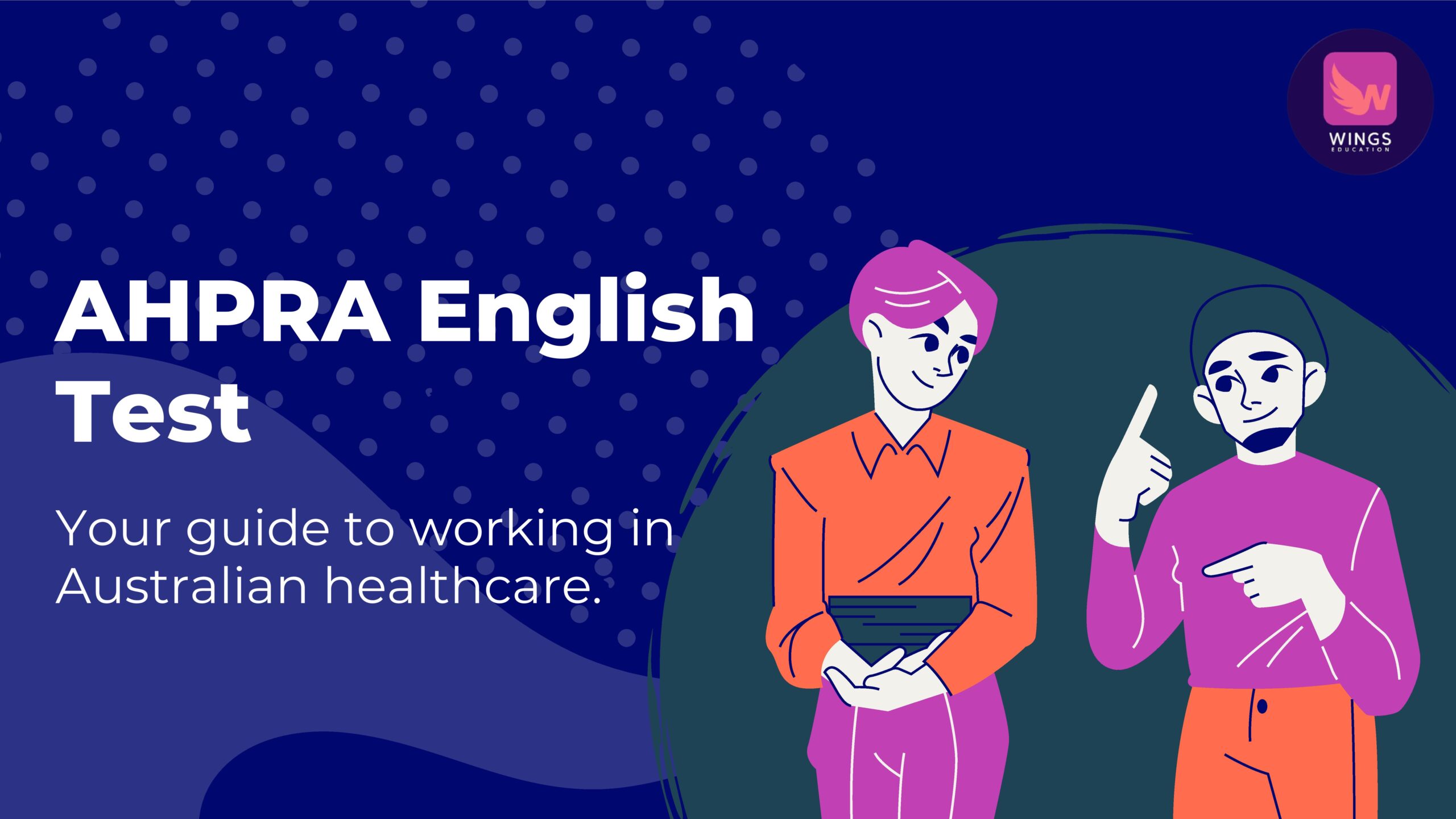
AHPRA English Language Test – Everything You Need to Know
A comprehensive guide to the AHPRA English language test, including prerequisites, approved tests, results, exclusions, and advice for Australian healthcare workers.
When it comes to working as a healthcare professional in Australia, communication is more than a skill—it’s a lifeline. Whether you’re a nurse explaining treatment plans, a physiotherapist discussing recovery steps, or a midwife offering comfort in the delivery room, clear communication can make all the difference. That’s why the AHPRA English language test exists—to ensure that every registered healthcare worker in Australia can communicate safely, effectively, and confidently.
If you’re planning to register with the Australian Health Practitioner Regulation Agency (AHPRA), understanding the English language requirements is one of your first steps. In this guide, we’ll explore everything about the AHPRA English language test—from who needs it to what’s accepted, how it’s assessed, and how you can prepare without feeling overwhelmed.
1. Why Does AHPRA Have an English Language Requirement?
Healthcare in Australia is a multicultural space. Patients come from diverse backgrounds, but English remains the primary language of medical communication—from patient charts and prescriptions to safety guidelines and emergency instructions.
AHPRA’s English requirement is not about judging your accent or style of speaking. Instead, it focuses on your ability to:
- Understand complex medical information.
- Communicate effectively with patients, families, and colleagues.
- Document healthcare records accurately.
- Follow safety protocols without misunderstandings.
The AHPRA English language test ensures that healthcare professionals can operate in high-pressure environments without the risk of miscommunication.
- Who Needs to Take the AHPRA English Language Test?
If you are an internationally trained healthcare professional or if English is not your primary language, you will likely need to demonstrate your language skills before being registered.
This pertains to a variety of AHPRA-regulated professions, such as:
- Nurses and midwives
- Doctors (medical practitioners)
- Dentists and dental hygienists
- Physiotherapists and occupational therapists
- Pharmacists
- Podiatrists
- Psychologists and other allied health professionals
Even if you’ve studied in English in another country, you might still need to meet AHPRA’s specific test score requirements.
3. How Can You Meet the AHPRA English Language Requirement?
AHPRA allows multiple ways to prove your English proficiency. The most common route is through approved English language tests.
3.1 Accepted English Tests for AHPRA
Currently, AHPRA accepts:
- IELTS Academic – International English Language Testing System
- OET – Occupational English Test (specific to healthcare)
- PTE Academic – Pearson Test of English Academic
- The Internet-based TOEFL iBT is the Test of English as a Foreign Language.
Each test has a minimum score requirement, which must be achieved in one sitting (although certain combined-score options are available in specific cases).
4. Minimum Test Scores for AHPRA
The AHPRA English language test standards are designed to ensure strong skills in listening, reading, writing, and speaking. While the exact scores vary by test, here’s a quick breakdown:
4.1 IELTS Academic
- Overall band score: 7.0
- Minimum score in each component (Listening, Reading, Writing, Speaking): 7.0
4.2 OET (Occupational English Test)
- Grade: B in each component (Listening, Reading, Writing, Speaking)
4.3 PTE Academic
- Overall score: 65
- Minimum score in each communicative skill: 65
4.4 TOEFL iBT
- Total score: 94
- Minimum in each section:
o Listening: 24
o Reading: 24
o Writing: 27
o Speaking: 23
These benchmarks are not negotiable—they represent the minimum safe standard for professional communication in Australian healthcare.
5. Can You Be Exempt from Taking the Test?
The AHPRA English language test is not required for all individuals to take. You may be exempt if:
- You completed secondary education and tertiary qualifications in English in an approved country (Australia, UK, USA, Canada, New Zealand, Republic of Ireland, South Africa).
- All of the instruction and evaluation for your healthcare training took place in an authorized nation and English.
- You’ve been working in an English-speaking healthcare setting for a certain period before your application.
However, these exemptions are subject to AHPRA’s verification process. Always check the latest guidelines before assuming you’re exempt.
6. Which Test Should You Choose?
If you’re required to take an English test, your choice depends on your strengths and professional needs:
- IELTS Academic – Well-known, widely available, but can be challenging in writing.
- OET – Healthcare-focused scenarios, easier for those familiar with medical English.
- PTE Academic – Fully computer-based, faster results, flexible scheduling.
- TOEFL iBT – Suitable for those comfortable with academic English and online test formats.
Your decision should factor in test dates, availability, cost, and your comfort level with the format.
7. Preparing for the AHPRA English Language Test
AHPRA doesn’t provide its test, so preparation means working on your chosen exam format. Here are key tips:
7.1 Understand the Format
Knowing the test structure is half the battle. If you’re taking PTE Academic, for example, you’ll need to get familiar with computer-based speaking tasks. If it’s OET, practice medical role-play scenarios.
7.2 Work on All Four Skills
Some candidates focus too much on speaking and writing but lose marks in listening or reading. A balanced approach is essential.
7.3 Use Official Practice Materials
Always use sample papers and mock tests from the official test providers to avoid surprises.
7.4 Simulate Test Conditions
Practicing in a noisy café won’t prepare you for the real test environment. Make every effort to mimic the precise time, tempo, and stress of the test day.
7.5 Focus on Medical English (if relevant)
If you choose OET, brush up on common medical terminology, patient instructions, and professional etiquette in English.
8. Common Challenges and How to Overcome Them
Many healthcare professionals find the AHPRA English language test challenging, not because they lack English skills, but because they’re unfamiliar with the testing style.
- Writing under time pressure – Practice writing essays, letters, or reports within the time limit.
- Speaking confidently – Record yourself speaking on various healthcare topics and listen for clarity, pronunciation, and fluency.
- Listening for details – Practice with audio clips that include accents from different English-speaking countries.
- Reading long passages – Build stamina by reading professional journals or news articles in English.
9. How Long Are Test Results Valid?
For AHPRA registration, your test results are typically valid for two years from the date of the test. This means you should plan your exam timing carefully, especially if your application process will take several months.
10. What Happens If You Don’t Pass?
Failing the AHPRA English language test isn’t the end of your healthcare career dreams—it just means you’ll need more preparation before trying again.
Many candidates improve their scores after identifying weak areas and practicing strategically. In some cases, switching to a different accepted test format can also help.
11. Beyond the Test – Real-Life English in Australian Healthcare
The first stage is passing the AHPRA English language exam. Once you start working, you’ll be using English in real, unpredictable situations—explaining diagnoses, calming distressed patients, collaborating with other professionals.
The true goal is functional fluency—being able to communicate naturally, clearly, and compassionately, even under stress.
12. Key Takeaways
- Healthcare professionals in Australia are guaranteed to be able to communicate safely and effectively thanks to the AHPRA English language test.
- Accepted tests include IELTS Academic, OET, PTE Academic, and TOEFL iBT.
- Minimum score requirements are non-negotiable.
- Some applicants are exempt based on their education and work history.
- Preparation is crucial—know your test, work on all skills, and simulate exam conditions.
- Passing the test is not the end—it’s the foundation for real-world communication in healthcare.
Final Thoughts
If you dream of a healthcare career in Australia, the AHPRA English language test is not just a requirement—it’s your gateway to professional success. It demonstrates that you can deliver safe, effective, and compassionate care within one of the most respected healthcare systems in the world.
By understanding the requirements, choosing the right test, and preparing with focus, you can not only meet the standard but exceed it—bringing you one step closer to your goal of helping patients and building a career in Australia’s dynamic healthcare sector























